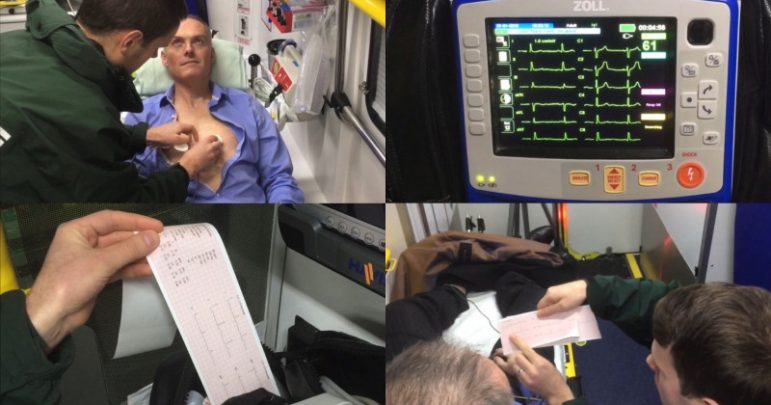A STUDY by West Midlands Ambulance Service to see if more heart attacks could be identified earlier has the potential to save hundreds of lives – not just across the UK but around the world.
WMAS has been joined by two other ambulance services for the research which has been funded by the British Heart Foundation.
Every year in the UK there are 200,000 hospital visits due to heart attacks – the equivalent of one every three minutes.
In the 1960s more than seven in 10 heart attacks were fatal but treatment advances has cut that number to three in 10.
A heart attack, different to a cardiac arrest, happens when there is a sudden loss of blood flow to a part of your heart muscle.
Heart attack symptoms vary from one person to another.
The most common signs are pain or discomfort in the chest but other symptoms can include pain in the arm, neck, and jaw, or feelings of sickness, light-headedness or shortness of breath.
Now frontline ambulance crews from West Midlands, South Western and the Welsh Ambulance Services will work with researchers at Kingston University and St George’s, University of London, Swansea University and the University of Leeds to identify if there are additional times when ambulance crews should perform an ECG (electrocardiogram) test.
Currently a pre-hospital ECG is performed on patients complaining of acute chest pain. The device measures electrical activity in the heart through a series of wires attached to the patient’s chest.
Research Paramedic Josh Miller, said: “Data already shows in about a third of cases, when a patient is having a heart attack, they haven’t had an ECG done by the ambulance crew because the patient didn’t show any of the classic signs.
“Earlier studies show this is more common in older people and particularly women.
“Because of this, the study will look to see if there are other atypical signs that ambulance staff should be looking out for.
“This is important because if an ECG was done on these patients they would get the specialist treatment they need more quickly, which might result in the crew bypassing the local hospital and going straight to a specialist centre, which means more patients will survive.”
As part of the study past medical records where patients have had a heart attack will be examined to see if an ECG was carried out or not and if there was an indication as to why not.
Focus groups with paramedics will help them better understand their decision making processes on whether to do an ECG.
Whilst there will be no immediate changes for ambulance crews, the study could lead to significant developments worldwide.
Josh added: “We might need to change our advice to ambulance staff as to when they choose to do an ECG so that they do an ECG more often and therefore pick up more heart attacks.”
Another change may be ambulance workforce provision – not all ambulance services around the world have a paramedic on board as they do in the West Midlands.
Having one to hand to interpret an ECG could help identify ongoing heart attacks and lead to patients getting straight to a specialist centre.











